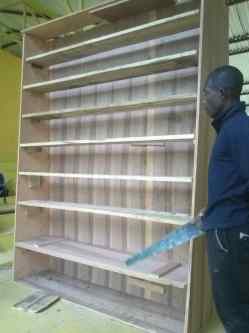by Brady
As 2018 comes to a close, I find myself reflecting on the victories and setbacks Untold International has experienced in the last twelve months as we attempt to finish a language arts center in a rural village in Ghana.

Building progress has been frustratingly slow. We went into Ghana thinking we could get the building done within six months, a prospect I laugh at now. Between issues with fundraising, money transfers, structural mistakes, and laissez faire contractors, that six months has stretched into three years. This is, oddly enough, incredibly common in Ghana. The landscape there is dotted with half-finished concrete structures; people commonly add a bit at a time as they get the money, taking years and sometimes decades to make something habitable. We didn’t intend to follow this trend, but we ended up building more like the locals than we meant to. The silver lining is that we’ve kept going, and we now have beautiful, finished building that just needs furniture to be operational.
 We have begun building the furniture, starting with big, double-sided bookshelves that are coming out nicely. They are being built by a local carpenter named Kwaata, who also did the concrete forms. Once we get just $2,000, the furnishings will be done and the center can open.
We have begun building the furniture, starting with big, double-sided bookshelves that are coming out nicely. They are being built by a local carpenter named Kwaata, who also did the concrete forms. Once we get just $2,000, the furnishings will be done and the center can open.
And open it will! We are actually now planning the opening and inauguration of Kasadwini Atenaeɛ (the language arts center in Asisiriwa) for either late February or early March of 2019. The local community has requested that Kaitlyn and I be present for the opening, and they are all very excited! This will be a huge milestone for us as an organization, and for all the individuals involved. If you would like get involved in making this a reality, we have more good news!
Untold International now has its own 501(c)3 status! This means that all donations made directly to us are tax deductible. So if you’re looking for a nonprofit organization to make an end-of-year donation to, consider us! You would be directly contributing to the opening of Kasadwini Atenaeɛ, and you could see the impact of your donation within just three months. We’ll be posting pictures and videos of the inauguration in March so you can celebrate with us! Click here to donate now.
Thank you to everyone who made 2018 an important year for Untold, and thank you in advance to everyone who comes along with us to make 2019 the beginning of a new era for the community of Asisiriwa. We’re just a few months away from changing some futures forever, and I grin wildly at the imagination-baffling potential that’ll be unlocked when these kids have the resources to empower themselves.






 Names are important. When the people of Asisiriwa and the surrounding villages walk by the bright blue and yellow building with the cool, slanted roof and see the signboard outside that says Kasadwini Atenaeɛ, they will know that their language matters, that something new and exciting is happening, and that somehow art is being consumed or created through words. And they will be welcome to join in.
Names are important. When the people of Asisiriwa and the surrounding villages walk by the bright blue and yellow building with the cool, slanted roof and see the signboard outside that says Kasadwini Atenaeɛ, they will know that their language matters, that something new and exciting is happening, and that somehow art is being consumed or created through words. And they will be welcome to join in.